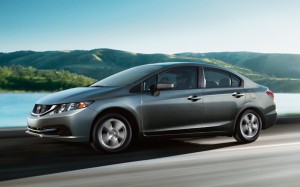
The 2015 Honda Civic CNG will be the last iteration of CNG vehicles sold in the U.S. by America Honda.
American Honda is giving up on building compressed natural gas vehicles for the U.S. market.
John Mendel, executive vice president, told a press conference in Detroit that Honda has tried to interest American consumers in CNG vehicles since 1998 and the idea of vehicles fueled by natural gas has never caught on despite the decline in the price of natural gas.
Honda is also ending production of the Accord hybrid for one year but will bring it back for the 2017 model year with improvements in fuel efficiency, Mendel said.
Honda is also working on updated version of fuel-cell vehicles and launch a new plug-in-electric vehicle as well as a battery-electric vehicles, sometime in 2018, Mendel said. PHEV vehicle and battery-electric vehicle will not carry the Accord or Civic names but will have new badges and will serve as “pillars” of Honda’s model line in the future, Mendel said.
“We’re developing a completely new generation of electric vehicles,” he said.
CNG vehicles, however, will not be part of the Honda product portfolio in the future, he said. The refueling of natural gas vehicles, which is difficult due to the requirements for enormous pressure and special fitted tanks, is simply too complex. Going back to 1998, Honda has tried various strategies for fueling CNG vehicles and none of them have worked, Mendel said.
“One of the things we’ve learned is that customers are not willing to compromise in dealing with infrastructure issues,” he said.
In addition, while natural gas is plentiful, the price advantage it might enjoy has been nullified by the recent declines in the price of gasoline. “We gave it a pretty good shot but that market is just not there,” he said. Advocates of natural gas vehicles such as Oklahoma oilman T. Boone Pickens have insisted that CNG could and should become the motor fuel of choice in the US because of abundance.
(Ford going mainstream with CNG with F-150. For more, Click Here.)
Pickens isn’t alone in his opinion. While Honda is getting out, other automakers – notably Ford and General Motors – are jumping in with both feet. Ford announced last month it will roll out a CNG-powered F-150.
“We surveyed customers likely to use natural gas or propane, and 72% told us they want to have these alternative-fuel capabilities available on F-150 with the 5.0-liter V8 engine,” said Jon Coleman, Ford fleet sustainability and technology manager. “We expect the gaseous-fuel prep package will be even more popular than it was on the 2014 F-150 with the 3.7-liter V6 engine, given the capability of the 2016 F-150 5.0-liter V8.”
The new CNG package is designed for the 5.0-liter V-8 version of the all-new aluminum-intensive F-150. The maker previously offered a natural gas package for the less capable V-6 on the old F-Series truck. The maker claims the new version can haul “hundreds of pounds more” cargo, while also boosting towing capacity.
(Click Here for details on the CNG-powered Chevy Impala.)
The basic factory package – which allows a vehicle to run on either propane or CNG – will go for $315 on the 2016 F-150 – which includes such things as modified valves.
But that doesn’t include the necessary fuel tanks, fuel lines and fuel injectors. That part of the conversion process must by completed by a qualified vehicle modifier, and is expected to run from $7,500 to $9,500, according to Ford.
While General Motors and Fiat Chrysler have pickup packages they are only available on heavy-duty models of the Chevrolet Silverado and GMC Sierra. The maker added a CNG version of the Impala in 2013 as well. The Ram 2500 CNG package is only offered to commercial and fleet buyers.
Mendel, however, Honda is willing to grapple with the infrastructure problems associated with fuel cells. Vehicles powered by fuel cells, which can produce electricity to run electric motors, have more support from the government and other organizations than CNG.
(To see more about the environmental friendliness of CNG vehicles, Click Here.)
However, fuel cells also come with their own limitations and critics, such as Tesla chief executive and founder Elon Musk, who has suggested the technology is impractical.

This isn’t surprising. Even in Europe, where a large percentage of models (incl. US models) are available with “GPL”, its just not convenient. In Palermo, a city of 1M, there were only two places to fill my Chevy Aveo (called Sonic here), so I was using gasoline at least half the time. And since the power and range were less, I could barely make it across Sicily without the car having to switch itself off compressed gas. Our new car is diesel, as is normal (80% of cars) there.